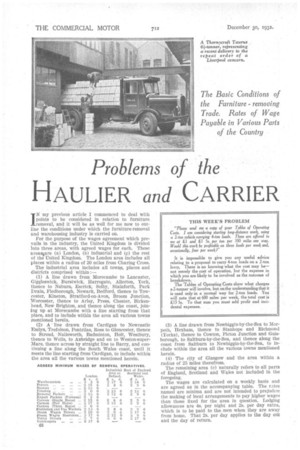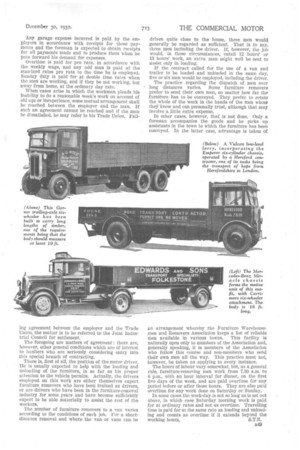Problems of the
Page 62

Page 63

If you've noticed an error in this article please click here to report it so we can fix it.
HAULIER and CARRIER IN my previous article I commenced to deal with points to be considered in relation to furniture removal, and It will be as well for me now to outline the conditions under which the furniture-removal and warehousing industry is carried on.
For the purpose of the wages agreement which prevails in the industry, the United Kingdom is divided into three areas, with agreed wages for each. These areasere (a) London, (b) industrial and (c) the rest of the United Kingdom. The London area includes all places within a radius of 20 miles from Charing Cross.
The industrial area includes all towns, places and districts comprised within :— (1) A line drawn from Morecambe to Lancaster, Giggleswick, Burstwick, Harrogate, Allerton, York, thence to Naburn, Escrick, Selby, Stainforth, Park Drain, Fledborough, Newark, Bedford, thence to Towcester, Kineton, Stratford-on-Avon, Broom Junction, Worcester, thence to Arley, Press, Chester, Birkenhead, New Brighton, and thence along the coast, joining up at Morecambe with a line starting from that place, and to include within the area all various towns mentioned herein.
(2) A • line drawn from Cardigan to Newcastle Emlyn, Trefoinon, Pontrilas, Ross to Gloucester, thence to Stroud, -Nailsworth, Badminton, Holt, Westbury, thence to Wells, to Ambridge and on to Weston-superMare, thence across by straight line to Barry, and continuing a line along the South Wales coast, until it meets the line starting from Cardigan, to include within the area all the various towns mentioned herein.
(3) A line drawn from Newbiggin-by-the-Sea to Morpeth, Hexham, thence to Stanhope and Richmond (Yorks), thence to Cowton, Picton Junction and Guisborough, to Saltburn-by-the-Sea, and thence along the coast from Saltburn to Newbiggin-by-the-Sea, to in• elude within the area all the various towns mentioned herein.
(4). The city of Glasgow and the area within a radius of 25 Miles therefrom.
The remaining area (c) naturally refers to all parts of England, Scotland and Wales not included in the foregoing.
The wages are calculated on a weekly basis and are agreed as in the accompanying table. The rates named are minima and are not intended to prejudice the making of local arrangements to pay higher wages than those fixed for the area in question. Lodging allowances are 4s. per night and 2s. per day extra, which is to be paid to the men when they are away from home. That 2s. per day applies to the day out and the day of return.
Any garage expense incurred is paid by the employers in accordance with receipts for those payments and the foreman is expected to obtain receipts for all payments made and to produce them when he puts forward his demand for expenses.
Overtime is paid for pro rata, in accordance with the weekly wage, and any odd man is paid at the standard rates pro rata to the time he is employed. Sunday duty is paid for at double time rates when the men are working, and if they be not working, but away from home, at the ordinary day rate.
When cases arise in which the workman pleads his Inability to do a reasonable week's work on account of old age or inexperience, some mutual arrangement shall be reached between the employer and the man. If such an agreement cannot be reached and if the man he dissatisfied, he may refer to his Trade Union. Fail
ing agreement between the employer and the Trade Union, the matter is to be referred to the Joint Industrial Council for settlement.
The foregoing are matters of agreement : there are, however, other general conditions which are of interest to hauliers who are seriously considering entry into this special branch of contracting.
There is, first of all, the position of the motor driver. He is usually expected to help with the loading and unloading of the furniture, in so far as his proper attention to the vehicle permits. Actually, the drivers employed on this work are either themselves expert furniture removers who have been trained as drivers, or are drivers who have been in the furniture-removal industry for some years and have become sufficiently expert to be able materially to assist the rest of the workers.
The number of furniture removers to a van varies according to the conditions of each job. For a shortdistance removal and where the van or vans can be driven quite close to the house, three men would generally be regarded as sufficient. That is to say, three men including the driver. If, however, the job would, in those circumstances, entail 12 hours' or 13 hours' work, an extra man might well be sent to assist only in loading.
If the contract called for the use of a van and trailer to be loaded and unloaded in the same day, five or six men would be employed, including the driver.
The practice regarding the dispatch of men over long distances varies. Some furniture removers prefer to send their own men, no matter how far the furniture has to be conveyed. They prefer to retain the whole of the work in the hands of the men whom the know and can personally trust, although that may involve a little extra expense.
In other cases, however, that' is not done. Only a foreman accompanies the goods and he picks up assistants in the town to which the furniture has been conveyed. In the latter case, advantage is taken of an arrangement whereby the Furniture Warehousemen and Removers Association keeps a list of reliable men available in various towns. This facility is naturally open only to members of the Association and, generally speaking, it is members of the Association who follow this course and non-members who send their own men all the way. This practice must not, however, be taken as applying to _every instance. The hours of labour vary somewhat, but, as a general rule, furniture-removing men work from 7.30 a.m. to 6 p.m., with an hour interval for dinner, on the first five days of the week, and are paid overtime for any period before or after those hours. They are also paid overtime for any work done on Saturday or Sunday. In some cases the week-day is not so long as is set out above, in which case Saturday morning work is paid for at ordinary rates and not as overtime. Travelling time is paid for at the same rate as loading and unloading and counts as overtime if it extends beyond the working hours,




























































































